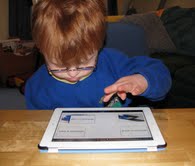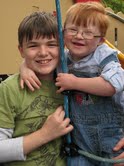
 William is a happy, enthusiastic and energetic 6 year old with multiple disabilities, who has bravely faced huge challenges with the help of many people. We, his parents Colin and Bev, and his elder brother Joseph, would like to share his story so far with you.
William is a happy, enthusiastic and energetic 6 year old with multiple disabilities, who has bravely faced huge challenges with the help of many people. We, his parents Colin and Bev, and his elder brother Joseph, would like to share his story so far with you.
William was born in 2005 with Down syndrome, hearing impairment, duodenal atresia, Hirschsprung’s disease and thyroid deficiency. For a period when he was about 6 months old, he suffered epileptic seizures, diagnosed as West syndrome. He had his first major operation when he was 1 day old, and has needed several more since. He has spent many months in the hospital, and without the dedication of the medical and nursing staff at the Royal Victoria Infirmary he wouldn’t be alive today.
The combination of poor muscle tone, the seizures and the abdominal surgery meant William needed a lot of expert help right from the start. We are lucky that where we live there is an active early intervention program where physiotherapists, portage workers (portage is the home-visiting educational service in the UK for pre-school children with additional support needs), speech and language therapists and occupational therapists work together around the child. Just learning to roll over was a major success, and something we vividly remember.
When William was 3 months old, we started taking him to weekly therapy sessions at the Education Centre for Children With Down Syndrome (ECCDS), which had only recently been founded. There we learned a great deal, and were overwhelmed to meet so many other children and families facing similar challenges – we weren’t alone!
In early 2008, Making Changes Together was set up in County Durham as a way for parents and professionals to work together to improve services for children and young people with additional needs. Bev became actively involved, and it was a friend she met through MCT who suggested that we get William an iPad. We could see that a tablet device had the potential to be hugely more accessible to William than a traditional computer, and we were very fortunate that in early 2011 the Sol Curry Charitable Trust awarded him an iPad 2 to support his education at home and in school.
Finding apps that we could use to help William with his development was difficult. His poor fine motor control, and the ease with which he could be distracted, prevented him from using many otherwise very good apps. So we decided we’d try to write our own! We had both worked in IT and education, knew we could do the programming ourselves, and had a rough idea of what we wanted in an app. So we started learning all about iOS application development.
We set about writing our first app, Special Words. Maggie Hart, founder of ECCDS, looked at it and said we must get it out to help other children. So we founded our non-profit social enterprise Special iApps, with the help of grant funding from UnLtd, and then we took a prototype 300 miles to show Down Syndrome Education International, who for over 30 years have been working to improve understanding of the learning needs of children with Down syndrome and pioneering effective teaching and therapy approaches. They agreed to let us incorporate images from their paper-based See and Learn educational program.
In August 2011, we submitted Special Words to Apple, and anxiously held our breath “would they approve it?” Five days later they did! We set up our website and Facebook page, and launched on September 1st. We have been overwhelmed by the enormously positive feedback we’ve received, and have now incorporated many really good suggestions from parents and professionals. We had initially hoped Special Words would help children to learn their first written words, but parents and teachers of children with Down syndrome, ASD and many other disabilities, some younger than 1 year old, are telling us that it’s also improving their fine motor skills, hand-eye co-ordination and attention.
With the help of volunteer translators, Special Words now includes 12 languages, and has been downloaded in more than 30 countries. William’s brother Joseph speaks the words for UK English. It’s thrilling to know it’s being used in homes, schools and therapy settings around the world, and that we’ve achieved our goal of making it simple enough for the children to use, and at the same time highly personalizable and configurable.
William communicates mostly using Makaton sign language, and doesn’t have many spoken words, but understands much more than he can express. He attends a local mainstream school, Gilesgate Primary, where he has lots of friends. We and his teachers have been able to use Special Words not only to increase his vocabulary, but to conclusively demonstrate just how many words he knows, and he has surprised us all. He’s now starting to read short sentences, and our second app, “Special Stories, released in December, is proving invaluable for quickly building simple stories with text, pictures and sound. Tasks that used to take hours of printing, cutting and laminating can now be done in minutes, and William has become adept and enthusiastic at selecting stories to read on his iPad.
William takes his iPad with him everywhere: to school, therapy sessions, and even parties. We use Special Stories to create little books about everything we do. We and other parents also find it a powerful tool for school-home communication: William can’t tell us verbally what he did at school, but his learning support assistant takes photos during the day and creates a short story that we can then share with him at home. He gets really excited showing us everything he’s been doing!


This is fantatstic! We have a son that has Autism. He has an iPad and it has been awesome! He is high-fucntioning, but still has many demands in communication and socialization. I will look for Special Stories as he needs ways to see how things happen and how he must adjust to transition. Thanks for sharing and funny enough, our son is William too.
Hi there
These apps are often directed at children, which is fantastic. However can you direct me to some apps that might be suitable for adults with learning difficulties who need some help with word recognition etc?
Thank you